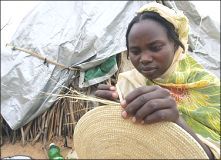UN plans to start repatriating refugees from S Sudan in September
By TOM MALITI, Associated Press Writer
NAIROBI, Feb 18, 2005 (AP) — The U.N. refugee agency plans to start in September repatriating 560,000 people who fled southern Sudan during the region’s two-decade conflict, a top agency official said Friday.

|
|
A Sudanese girl weaves a basket to be sold in a local market while sitting outside her makeshift home in the Internally Displaced Persons camp of Krinding. (AFP). |
The refugees, living in seven neighboring African countries, should be able to return now that the Sudanese government and main southern rebel group signed a Jan. 9 comprehensive peace deal to end the 21-year conflict, UNHCR’s Deputy High Commissioner Wendy Chamberlain told said.
A repatriation plan is being worked on, but the U.N. agency has only received one-tenth of the US$40 million (A?30.7 million) initial repatriation funds needed to build schools, roads and clinics and provide drinking water in the devastated region, she said.
The refugees “have to return home to communities that are safe and to prospects of livelihood,” Chamberlain said. They should not “face the kind of hardships that will lead them to leave again.”
Chamberlain could not say how long the repatriation would take.
The 560,000 refugees are in Central African Republic, Congo, Egypt, Eritrea, Ethiopia, Kenya and Uganda, said George Okoth-Obbo, the agency’s representative in Kenya. About 240,000 are in Uganda.
They will be repatriated to their home areas of Equatoria and Upper Nile, in Sudan’s south, and the Blue Nile region, in central Sudan, said Mohammed Dualeh, the agency’s operations coordinator for south Sudan.
An estimated 200,000 refugees who had not registered with the U.N. agency have returned from Uganda since the peace deal was signed, Chamberlain said.
Another 400,000 or so displaced persons who were sheltering in northern Sudan went home, she said.
The peace agreement stipulates the creation of a new transitional national government, in which the rebel Sudan People’s Liberation Army will have several positions in the Cabinet.
It also gives 10 states in southern Sudan a regional government and legislature. After a six-year transition period, southern Sudanese will be able to vote in a referendum on whether to secede.
The 21-year war pitted the Arab Muslim-dominated government in Khartoum against rebels fighting for greater autonomy and a larger share of the country’s wealth in the largely African animist and Christian south.
More than 2 million people have died, mainly from war-induced famine and disease, and at least twice as many fled their homes to either the north of the country or neighboring states.
